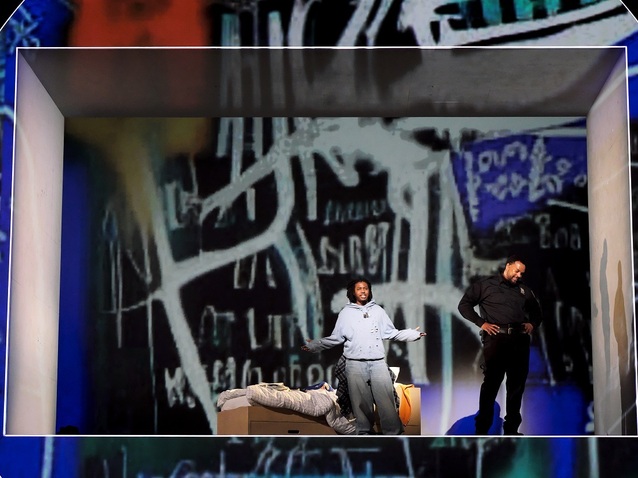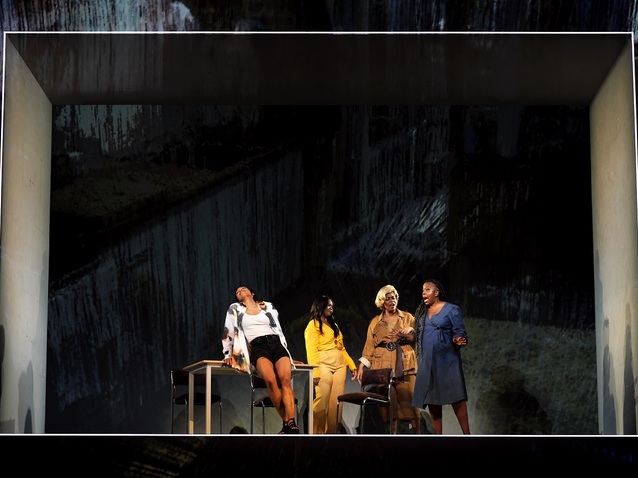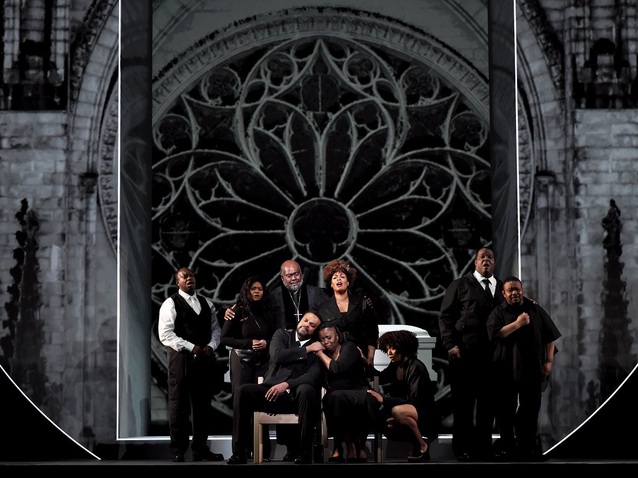 © Zoe Martin
© Zoe Martin
Blue, written by Tony Award winning composer Jeanine Tesori and librettist Tazewell Thompson, sees a tragedy occur against the backdrop of a clash between a father and son and the way in which black people are treated in society at large. Set in Harlem in 2007 it sees a black Mother and Father have a Son, all of whom are only ever referred to by those names. As soon as The Mother even tells her friends she is pregnant, they tell her there is no future for black boys because of the prejudices that exist in the world. We then fast forward to 2023 to see the now sixteen-year old Son arguing with his Father who is a policeman. The Son is an activist who is attempting to fight for social justice, but The Father is frightened that he will end up being in serious trouble or irrevocably harmed. To an extent, their confrontation represents a generational divide, but this takes on further dimensions given The Father’s occupation, which alienates The Son, and his fear of what may happen to his offspring on account of his skin colour. The second half of the opera considers various characters’ reactions to the tragedy that follows, while we only discover at the very end exactly what happened and learn that it is even sadder perhaps than we previously thought.
The opera premiered at the Glimmerglass Festival in 2019 and has enjoyed considerable success in America since, but Tinuke Craig’s new production for English National Opera constitutes the first time it has ever been seen in the United Kingdom. Alex Lowde’s set is ingenious as it features an upright circle with a rectangle cut out of it, with the performers occupying the space created by this for the majority of the time. This rectangle revolves so that for some scenes it presents a landscape format and others a portrait one. As the action progresses, and the tragedy becomes all too clear, it also stops at awkward angles so that the singers perform on a slope that hints at their state of mind. There are also occasions when it revolves while people are in it so that it illustrates visually The Mother’s inconsolable anguish. Projections appear on and behind this circle, courtesy of video designer Ravi Deepres, that relate to the scene in question by revealing the streets of Harlem or football pitches when The Father and his colleagues watch a game in a bar.

ENO Blue 2023, Idunnu Münch, Chanáe Curtis, Sarah-Jane Lewis, Nadine Benjamin © Zoe Martin
The opera is emotive in a variety of ways. When The Father and Son confront each other in Act I it is quite heartbreaking to witness the youth’s bitter words towards his parent as he accuses him of upholding an oppressive system. When the Father responds by telling him he will always love him, it reveals just how much the Son’s words hurt him, but this does not mean The Father is totally in the right as it is clear The Son is misunderstood. The Father admonishes him for leaping over turnstiles to ride the subway, seeing it as a petty and pointless criminal act. He therefore has no comprehension of how the Son is protesting because so many have no choice but to spend their vital income on travelling to work.
The scene in church in Act II is deeply emotional for more overt reasons, and the music is highly effective at bringing out all of the pathos in the situation without always feeling bleak itself. Overall, the score contains influences from jazz, gospel and musical theatre, and its real skill is in ensuring that, while it remains easy to identify particular parts that are in certain styles, these are fused together so well that it still comes across as a coherent whole.
In spite of all this, the impact of the opera is marred by several things. There are times when it feels as if the scenes are simply designed to feed us with a multitude of points that the writers wish to make. In addition, attempts to establish the domestic context in which the action plays out are not helped by the fact that for a large amount of time The Father and Mother are seen apart, with each having their separate scenes. There is also a tendency towards cliché because, in reality, most ministers in 2023 would seek to comfort the distraught Father by engaging with his grief as opposed to calling him ‘my son’ and quoting the standard biblical lines.

The cast of ENO Blue 2023 © Zoe Martin
The whole point of the story is that this could be many people’s own, since prejudice and oppression are widespread. However, the secret to writing a relatable story is often to produce one that seems very specific to the people it is about. This is because those people then become real, which enables us to feel for them which in turn encourages us to relate their situations to our own. Here, there is a tendency, partly propelled by the staging, for the story to feel as if it is being told in the abstract. With its only ‘unique selling point’ being that The Father is a policeman, which makes his relationship with his Son more antagonistic, it can feel too general, which means the characters seem too much like launchpads for making a series of points rather than flesh and blood human beings in their own right.
Nevertheless, the evening’s musical credentials are notably strong with Matthew Kofi Waldren’s conducting of the English National Opera Orchestra proving particularly accomplished. The cast is also superb with Nadine Benjamin delivering a sublime performance as The Mother. Kenneth Kellogg is similarly outstanding as The Father as he combines a formidable bass-baritone with a suitability tormented persona. Despite not necessarily having the best material to work with, Ronald Samm is tremendous as The Reverend, while ENO Harewood Artist Zwakele Tshabalala delivers a mighty performance as The Son. As he skilfully highlights the combination of rebelliousness and conscientiousness that lies at the heart of the character, his fresh feeling and charismatic tenor rings out to excellent effect.
By Sam Smith
Blue | 20 April - 4 May 2023 | London Coliseum
the 26 of April, 2023 | Print
Comments